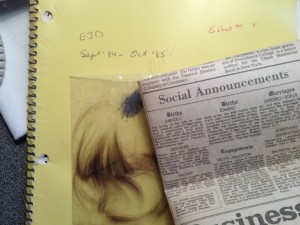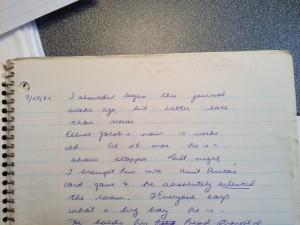Debra Darvick reviews Robert J. Wicks’ book ”˜Perspective’
Brother, courage comes and goes. Hold on for the next supply.
Thomas Merton
The first of three journals I kept, Elliot's first hair cut, his birth announcement in the NY Times.
T he first three years of my son's life, I kept a daily journal. Unbelievable, right? Through diapers and colic, first teeth and first words, I made time to record the wonder of our days.
Somewhere in those pages, sleep-starved and overwhelmed I wrote, "I just want to have perspective! I want to know that everything is going to turn out OK."
Years later I found the journal and began rereading it. I couldn't help but smile at the mother I was so long ago. Rereading that dramatic and universal cri de coeur, I realized what was impossible to grasp as a new mother: By its very definition, perspective requires time and distance from the very thing one strives so hard to see clearly.
I thought of that journal page when Robert J. Wicks' book [Perspective: The Calm Within the Storm](http://www.amazon.com/gp/product/B00HYZN6WI/ref=aslitl?ie=UTF8&camp=1789&creative=9325&creativeASIN=B00HYZN6WI&linkCode=as2&tag=reathespi-20&linkId=YJAUSQLCQO3YX3ED) 
Wicks structured this clear and useful book so that it is rich with bullet points, questionnaires for self-reflection, and carefully honed text bytes that can form the basis for a lifetime of step-by-step personal transformation. In addition to explication, educative text and recollections drawn from his own life and that of other seekers, philosophers, and authors, Wicks shares insights culled from the most up-to-date research in cognitive behavioral therapy and the psychology of optimism.
The chapter I found most intriguing focused on achieving perspective on one's "personal darkness." Recognizing that trauma is a part of life, Wicks invites readers to acknowledge trauma as a terrible experience and then recognize its potential as an opportunity for powerful growth and meaning. Reading this chapter, I was reminded of a quote by Thich Naht Hahn: No mud, no lotus.
The young perspective-seeking mother I was might have written that in her journal. And even though I long ceased writing about my children each day, as blessed as we have been, I sometimes still wish I could be assured that everything will turn out OK.
First page of the journal begun when Elliot was three months old. The apologia in red at the top of the page refers to a first three months of feeding and wiping...
- See more at: http://www.readthespirit.com/debra-darvick/debra-darvick-reviews-robert-j-wicks-book-perspective/?utm_source=rss&utm_medium=rss&utm_campaign=debra-darvick-reviews-robert-j-wicks-book-perspective#sthash.MKQ58yA1.dpuf


